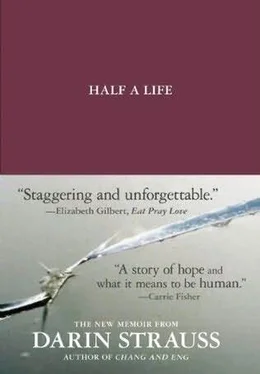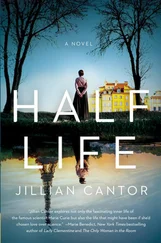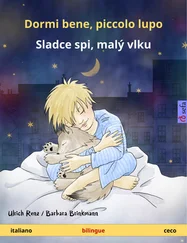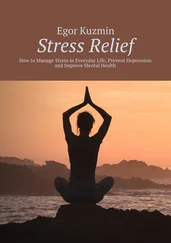There were cars everywhere, people who drove this road every day. The sad thing was not that they had no idea. It was that it wouldn’t have mattered to them if they had.
Minutes later I was outside, putting my hand up to oncoming traffic and jogging across the pavement alone. I was moving toward the median strip. Sunlight knifed through a few small areas of snow. My gloves were the kind that have a leather palm-patch to improve the grip. And here I stood, folding my arms for warmth, on crunching grass — the spot where it had happened. Or my approximation of that spot. If Celine lived anywhere, it was here. If the person I’d been before colliding with Celine was anywhere, it was here. February air hurt my cheeks. The breeze felt grainy; there was moisture in it. No crosses or markers set this part of the road off from any other. I looked down; heat from my boots was melting the crust in a small oval around my feet. Which is how insistent a body is, how much energy it has, even when you do nothing.
I spent a long time just looking around. The wind lifted the slender grass shoots every so often, ruffling what seemed like a field of tiny bobbing heads. I stood here taking shallow breaths. I tried not to look over my shoulder at Susannah and the twins. I cleared my mind. I was here again. The February sun, that cold-burning bulb, threw off a faint blue glare. West Shore Road, treeless and homeless, stretched a long way behind, a long way ahead. It must have been the nearby Long Island Sound that put this blue nuance into the air; but I couldn’t see the water itself — it was a hunch, a rumor. Maybe Celine’s tire had caught on some of the blown sand at the road’s edge.
And then I did look into the blue grainy distance, at my family. They waited in the car for me. (But so why had Celine swerved all that way — over two lanes, first crossing into one and then, after a wait, into the other?) Maybe she’d been startled by a noise. Or a bee had gone after her hand a couple times. But wasn’t there something I could have done differently? The only noises now were the muting sound of water someplace else — a whispering repetition — and the gathering and receding swish from an occasional car. These passing cars made our Honda rock a little bit. The two sounds sounded pretty much the same. I was surprised there weren’t accidents here every day. What could I possibly have done differently that morning with Celine?
My heart sped up, just as it had a few minutes before, when we’d driven to this place. Whether at any moment she was vivid or faint, forgiving or disagreeable, or nearly gone — Celine had stayed with me. Today’s sun was no more than the harsh glower of my past. I saw an office park: big glass Rubik’s-Cube buildings across the road, not very far off. There hadn’t been an office park here before. The cars on the road were makes that hadn’t existed when I’d had the accident. The grass was new, the nineteenth season of new grass. Maybe some of the sand on the shoulder was the same. I felt sad and distracted. Maybe the vaguely respiratory beach and road sounds were the same as they had been. Just sad in a distracted way: that was all I felt. I waved to Susannah and the boys. I don’t think they saw me. Or perhaps it was just that I couldn’t see them: the windshield was showing the rags and pinks of the sky, and I couldn’t make out Susannah’s features, only the shape of her head. (I say distracted because the sadness felt docile, and fuzzy.) There was nothing profound about feeling only sad. The car sound on the acoustic asphalt evoked a bit of anti-nostalgia: all the lonely schoolbus waiting of childhood, plus a death. My eyes were dry. I couldn’t do what Mrs. Zilke had commanded me to do. If I was able to have just this one life from here on out, what would Celine Zilke do without me now?
I wrote and wrote and listened close for whatever the past was trying to say to me. It was still tough even to think about this girl who died. 4
I omitted a thousand things, because a life is so much the same thing over and over. I omitted my being a ski bum in Aspen with some friends, including good old frontseat-passenger Dave, and getting so drunk the first night in town that my shoulders went numb; I omitted losing my virginity, or trying and failing to lose it — urging an evening to curl itself away and vanish. Those are what life is, but they are not at all Celine.
Day after day, draft after draft: I was surprised by the stuff that came out — my blunt and jumpy chapter and verse; the brake sounds and disclaimers. Until I started writing this, I’d forgotten the library books, the face I wore in my dorm, the way that Mr. Zilke had been at the court, angry, humble, and sad. And I realized I’d been lying to myself: that fact was the first thing I learned.
Maybe I could have done fifty things to avoid the accident. Left the car in the garage that day. Hurried through a yellow light that I’d stopped at. Gone to the beach instead of mini-golf. Been alone, not talking to friends. But I did all those things, and Celine hadn’t done the many things she could have to avoid the accident, either. All the things get done and you regret them and then you accept them because there’s nothing else to do. Regret doesn’t budge things; it seems crazy that the force of all that human want can’t amend a moment, can’t even stir a pebble.
“Was it worth the trip out?” Susannah said after a silence, on our drive home from West Shore Road. Everything man-made got taller, shinier — preparing to enter the competition of New York City. “Did it help?”
“Help to write it?” I said. “Or help, generally?”
This was back in the early days in my writing this story. Warmth was surging from the heater onto my face.
Susannah said, “Either one.” She turned her head and looked at me. “How do you feel?”
“I don’t know.” The words, inane and true. “I don’t feel—
— much”? “—all that I had expected”? “—something to cap off my experience”?
Part of me was still uncomfortable letting myself feel better about the accident, twenty years after it had happened. I worried what “better” would even mean. The mind is like a fish: stillness makes it afraid.
For a long time I had believed I was missing some crucial and important thing. There was a dead spot in who I was; a mildew. The same worry for my future that I’d felt at eighteen, at twenty, at twenty-seven, when that woman at the cineplex told me there was no way I could live with such a horrible past. 5
“So you didn’t experience anything too profound when we stopped,” Susannah said. “It’s a good sign, don’t you think? Or was it a waste of a trip?”
I agreed it was a good sign.
But often I couldn’t do the writing. I’d will myself into remembering, the way I had tried to will myself to tears during high school. Ignorance is maybe the most stable matter there is; it’s very hard to lift your personality from the bedrock of solidified principles, of petrified ideas.
I’d slump there at my writing desk, sweat out six gallons and maybe a hundred words; the next day I’d strain a little further. And then, finally, on the page, Celine was there again, cutting in front of me. And I was at the movie theater with Dave and Jim, not feeling enough and feeling so much. And the next writing day, the story got a little more vivid, and the truth more achievable; and also the day after that. It was in the doing , the rethinking, the simple inundation of it, like those bereavement tapes on infinite playback in lonely homes.
And at night, I could switch the computer off and walk down the hall to where the people now in my life were making their different sounds.
4. See the way a forgiving brain runs that sentence, even here, even now? The girl who died . I still have to fight against being passive, about being shy. Or, if you prefer, cowardly.
Читать дальше









